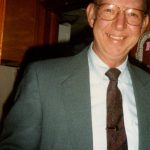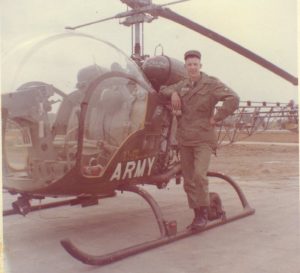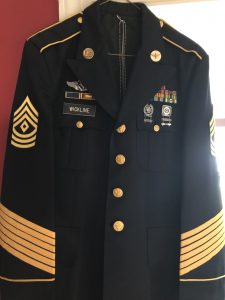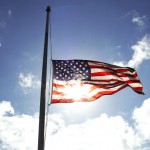Today is the second time in my life that I have written a eulogy for a loved one. It’s been 17 years since I wrote my Mother’s tribute; 17 years since both my Father and Mother were alive at the same time. This assignment is one of the most important that I have ever had to complete: capture the essence of someone I knew and loved, and then tell others about that life.
 Born in the coal-mining town of Lochgelly, West Virginia in 1940, Emory Comet Wickline, commonly known as Buster, was one of eight children: three boys and five girls. He was the last male in his immediate family to have died. Dad surpassed his Father, both brothers and most of his sisters, surviving until the age of 79. Wanda Brown is now the only sibling left in his family and that’s not a bad thing: apparently, Wanda, my dad and their brother Harold were thick as thieves growing up. My grandfather was a coal miner and an alcoholic. My Father, who learned to drive at age 8 and drink moonshine at age 11, knew that if he didn’t leave West Virginia, he would die in or because of the coal mines. Like many children of that generation, my Dad quit school in the eighth grade to work to help support his family. He bravely picked the U.S. Army as his out and later earned his GED.
Born in the coal-mining town of Lochgelly, West Virginia in 1940, Emory Comet Wickline, commonly known as Buster, was one of eight children: three boys and five girls. He was the last male in his immediate family to have died. Dad surpassed his Father, both brothers and most of his sisters, surviving until the age of 79. Wanda Brown is now the only sibling left in his family and that’s not a bad thing: apparently, Wanda, my dad and their brother Harold were thick as thieves growing up. My grandfather was a coal miner and an alcoholic. My Father, who learned to drive at age 8 and drink moonshine at age 11, knew that if he didn’t leave West Virginia, he would die in or because of the coal mines. Like many children of that generation, my Dad quit school in the eighth grade to work to help support his family. He bravely picked the U.S. Army as his out and later earned his GED.
My father was a man who loved fiercely and spoiled those he loved. An enlisted man with the First Cavalry, Dad met my Mom on a dance floor in Ft. Lewis, Washington in 1960. She was a divorced mom on welfare with four children. She was an Italian from California, Catholic, and loved opera. He was German, younger than she was, and liked country music. He was smitten. They married on March 3, 1962, and began their life together with four children in tow: Robert, Kathy, Gwen and Lawrence. After my mother miscarried in 1965, I came into the world in 1967, and my Father was smitten again. I was a daddy’s girl. My Father adopted my four older siblings and always considered them just as much his children as I was. I measure all men I meet by my Father’s code: God, country, family. I met a man in 1990, whom I thought was good enough to bring home for daddy’s inspection. Michael Howard passed that review, and my daddy loved him like a son.
 My father was a man who expanded his horizons. After my parents married in Washington State, Army assignments took our family to Germany, Pennsylvania, Georgia, and finally Ft. Rucker, Alabama, where Dad retired in May 1984. Military families joke that when you are stationed in Germany, you come back to the states with a baby, a cuckoo clock and a shrunk. Our family came back to the states with all three because I was born there. Army hardship tours took him to Germany, Vietnam, Korea, and Thailand. Dad suffered from what we now know is post-traumatic stress after he returned from Vietnam. The West Virginia hillbilly also expanded his food horizons, and I grew up exposed to all sorts of yummy food from other cultures. His approach to food was impressive. Dad enjoyed spicy Chinese mustard on his egg rolls, all German, Italian, Mexican, and Thai food, but practically ate burnt meat when he ordered steak well done. He liked his fried eggs sunny side up, with the whites done, the yellow runny, but the egg white edges not crispy. He was a short-order cook’s worst nightmare. Dad would insist on a full glass of ice in his water because of his lack of access to ice and cold water in Vietnam. He loved anything my mother cooked or baked and introduced our children to warm Krispy Kreme doughnuts, didn’t he Connor? Despite his love of all food, my Dad was always the thin one in the family. You can only imagine our frustration with that genetic disposition.
My father was a man who expanded his horizons. After my parents married in Washington State, Army assignments took our family to Germany, Pennsylvania, Georgia, and finally Ft. Rucker, Alabama, where Dad retired in May 1984. Military families joke that when you are stationed in Germany, you come back to the states with a baby, a cuckoo clock and a shrunk. Our family came back to the states with all three because I was born there. Army hardship tours took him to Germany, Vietnam, Korea, and Thailand. Dad suffered from what we now know is post-traumatic stress after he returned from Vietnam. The West Virginia hillbilly also expanded his food horizons, and I grew up exposed to all sorts of yummy food from other cultures. His approach to food was impressive. Dad enjoyed spicy Chinese mustard on his egg rolls, all German, Italian, Mexican, and Thai food, but practically ate burnt meat when he ordered steak well done. He liked his fried eggs sunny side up, with the whites done, the yellow runny, but the egg white edges not crispy. He was a short-order cook’s worst nightmare. Dad would insist on a full glass of ice in his water because of his lack of access to ice and cold water in Vietnam. He loved anything my mother cooked or baked and introduced our children to warm Krispy Kreme doughnuts, didn’t he Connor? Despite his love of all food, my Dad was always the thin one in the family. You can only imagine our frustration with that genetic disposition.
My father was a man with many talents. My Mom used to tell me that the Bible says that God gives us all ten talents, but that it’s up to us to find out what they are and to develop them. Beyond his professional gifts, my Father honed his home improvement skills, car restoration skills, engine work, yard maintenance, vegetable and flower gardening, and woodworking. There was nothing he could not repair, replace, or create. Dad was the Clark Griswold of our neighborhood when he decorated our house at Christmas. When I worked at Walmart, he would almost stalk our seasonal manager, Heidi, when the Christmas items started rolling in. Santa had eight reindeer, including Rudolph and his red nose, and Dad needed all of them for his rooftop display. My co-workers there knew him instantly.
My father was a perfectionist in all of his work and hobbies except that one time. My Dad was an impatient man, and I get my lead foot from him. He was in a rush working in his woodshop, cutting two pieces of wood on his Shop Smith and cut off his index finger. The doctors were not able to reattach it. Later that day, I received a call from him while I was away at college. He casually mentioned that he had a shop accident and cut off his index finger. I drove home immediately. Decades later, when Dad had his second back surgery at Walter Reed, my 7-year-old daughter drew a picture of him for his hospital room. And, yes, it was anatomically correct, wasn’t it, Abby? But, that his how Dad was: casual in his approach to his health, but fierce when it concerned my mother or me. He was so freaked out when I fell and broke my arm on my skateboard that my Mom had to drive me to the base emergency room.
My Father was always the man behind the camera. Much like my husband Mike, Dad was the one who chronicled our family life. Despite the sad occasion for reviewing family photos, they brought back good memories, but I was happy to find ones of him in his element.
My Father had a sense of humor. He loved watching comedy shows and the comedic genius of Tim Conway and Harvey Korman on “The Carol Burnett Show” always had him laughing until tears ran down his face. He loved playing video games and remote-controlled cars, helicopters, and motorcycles. As a helicopter maintenance tech, his team and the pilots on the flight line knew that he had the shiniest combats out there. His Sunday night ritual of shining his combat boots was a sight to behold: cleaning his boots with a scruffy brush, adding the coats of black shoe polish and then melting them off ever so lightly with a small flame from a blow torch. His secret it out. Once a pilot asked my Dad how he maintained the shine on his boots. He replied, “Those choppers know not to scuff my boots, captain,” chuckling as he walked away. The military uniform was his life so much so that when he retired, and I moved away to college, I had to create a clothing chart for his civilian clothing so that his clothes would match before he left the house. We jokingly referred to it as the “Granimals Chart.”
My Father was our protector and a hunter. I grew up in a house with guns. Dad was a hunter, and we always traveled with his handgun under the front seat of our car. When a buddy was hungover from a New Year’s Eve celebration in the mid-1970s, Dad thought it would be a good idea to go hunting still – alone. He fell out of his tree stand and broke his foot. He had to hike several miles back to his car and drive his stick-shift truck home. He used a wooden stick to help him to drive home. This was classic Dad: a stubborn, determined finisher.
My father was old school. He did not want my mother to work outside the home, so he often worked a second or third job when I was growing up. He listened only to country music. He and my Mom attended every band concert where I performed; every football game where the band performed and every band competition. My Dad taught me how to drive on a stick shift. I can still hear his words as he sat on that backroad hill with me in his blue Nissan truck: “Ease off the gas and hit the clutch.” For someone who was impatient, he was surprisingly patient as he taught me how to drive. It wasn’t until I was pregnant with our son in 1997 that I traded in my cool red sports car for a sedan and stopped driving a stick shift.
My father was an alcoholic. The biggest challenge my Father faced was ending the cycle of alcoholism in his family. Dad battled his demon for decades before he finally got sober a second time in 1984. My exposure to his battle influenced my decision to drink seldom. My mother’s constant prayer and faith in God kept him safe during the darkest times.
My father was a man of faith. Dad converted to Catholicism, and we made our First Holy Communion together when I was seven. Receiving our sacrament together is a childhood memory that I have always cherished. My husband repeated that kind of Father’s love and faithful commitment when our son Connor made his First Holy Communion. When men of God act out on their faith, they leave a beautiful legacy for their children.
My Father was the “best Pop Pop” ever according to our children and knew how work the Grandfather gig. When I turned 40, Mike whisked me away to New York City for a long Labor Day Weekend to celebrate. When we left on Friday, our children were in their pajamas. When we returned that Monday, they were still in their pajamas. I asked my Dad why the children were still wearing their PJs four days later. His reply was classic Grandfathering: “They wished to wear their pajamas and eat pizza all weekend, so I let them.” I asked if they had any vegetables, salad, or fruit at all over the weekend. He replied, “No, that is not cool Pop Pop food.”
 My father was a traveling soldier who came home to his beloved West Virginia a decade ago. “Traveling Soldier” by the Dixie Chicks is one of the most poignant songs that I have ever heard. Travelers always wish to come home, despite the exciting new experiences traveling affords them. Going home for soldiers is even more meaningful. Dad moved back to West Virginia to be near his childhood sweetheart, who was a widow. Louise Morton died recently as well. He always did things his way and refused my offers of moving to Virginia to live with us, even as his health declined. Without the help of his neighbors and friends Pam and Scotty Allen, Dad would not have been able to stay in West Virginia. I would have moved him to our home two years ago after he quit driving. Of course, if I had done this, it would have meant that he would not be able to die in the state where he was born.
My father was a traveling soldier who came home to his beloved West Virginia a decade ago. “Traveling Soldier” by the Dixie Chicks is one of the most poignant songs that I have ever heard. Travelers always wish to come home, despite the exciting new experiences traveling affords them. Going home for soldiers is even more meaningful. Dad moved back to West Virginia to be near his childhood sweetheart, who was a widow. Louise Morton died recently as well. He always did things his way and refused my offers of moving to Virginia to live with us, even as his health declined. Without the help of his neighbors and friends Pam and Scotty Allen, Dad would not have been able to stay in West Virginia. I would have moved him to our home two years ago after he quit driving. Of course, if I had done this, it would have meant that he would not be able to die in the state where he was born.
He died in his beloved West Virginia. He died loved by family and friends after receiving last rites. His legacy of God, country, and family lives on through our children. And for that, I will always be grateful that Emory Wickline was my Daddy. Dad will be interned at Arlington National Cemetary with my mom.


